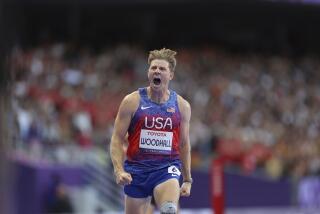A Sylke Smooth Slide
- Share via
PARK CITY, Utah — The Germans got their sweep, and Becky and Tom Wilczak got their hug. You might say all the stars in the women ‘s luge constellation were aligned properly Wednesday at Utah Olympic Park.
Germany’s Sylke Otto breezed to the gold medal with a time of 2:52.464 for her four runs. Barbara Niedernhuber finished second, .321 seconds behind her teammate, and German Silke Kraushaar was third, .401 out of first.
Austria’s Angelika Neuner bumped Wilczak from fourth to fifth on their fourth runs, but the River Forest, Ill., resident, who finished in 2:54.254, had the best consolation prize she could ask for waiting at the finish line.
Her father, Tom, was waiting with a hug, like he does at every race he attends. This was never a given. Wilczak likely needs a liver transplant within months to survive. If a suitable organ had become available anytime shortly before the Games, he would have been back in Chicago on Wednesday instead of at the sliding track.
But he arrived Monday night to watch his daughter realize her long-held Olympic dream, and he vowed to make his way to the finish line, even if athletes’ family members normally watch the competition from a hospitality tent up a steep slope from there. Helpful officials from the Salt Lake Organizing Committee and USA Luge arranged transportation to the finish area and a credential.
There Wilczak was, moments before his daughter’s fourth run, making the sign of the cross and watching first with nervous anticipation and then unbridled joy as she sailed down the frozen chute.
“It was a great surprise to have him there and give him a hug,” she said. “I was a little disappointed in my last run, and I said, ‘Oh, Dad.’ He said, ‘Don’t worry. You did great.’ I’m so happy he’s here, for him and for me because he has been there for me in my sport for the last 10 years.”
In 1987 Tom Wilczak was diagnosed as having autoimmune hepatitis, a disease in which a person’s immune system attacks the his liver. Medication controlled the illness until May 2000, when his condition began to deteriorate.
The Wilczaks hoped he would get a new liver early enough before the Games so he could attend without worry, but an appropriate liver hasn’t become available.
Tom Wilczak decided to come for Becky’s races anyway, but she struggled with the decision of whether she would compete if a suitable liver arrived just before or even during her event.
It was a decision she said she would make only if she had to, and the fact she now wouldn’t have to painted her face in relief after her final run.
“It’s a relief in the sense if a liver comes, I can go straight home and not worry about anything,” said Becky Wilczak, whose fifth-place finish tied the best ever by a U.S. luger in this event. “It has been an emotional roller coaster but things happen for a reason.”
Otto knows a bit about highs and lows, if only competitively. In the 1992 Albertville Games, she finished 13th and at 22 seemed to be a rising star. But the German luge program has more stars than a Hollywood opening. Otto missed the next two Games as the fourth-best German slider when only three athletes per country get to go.
She arrived in Salt Lake City determined to make up for lost time and not even a sore neck that she said hampered her starts was going to stop her. She took a .048-second lead over Niedernhuber in Tuesday’s first two runs and then assured herself the gold with a track-record 42.940 opening run Wednesday.
“I’m so happy,” she said. “There is nothing missing in my career now.”
More to Read
Go beyond the scoreboard
Get the latest on L.A.'s teams in the daily Sports Report newsletter.
You may occasionally receive promotional content from the Los Angeles Times.





